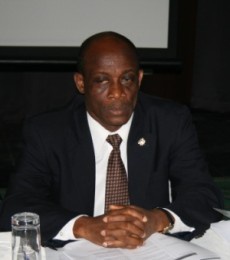The Ghana Cocoa Board (COCOBOD) is expected to reduce its cash injection into the economy this year by $300 million.
Last year, it injected $1.5 billion into the industry but Government has indicated that the amount meant for injection into the industry had been pegged at $1.2 billion, this year.
Seth Tekper, Minister of Finance, who made this known at the National Cocoa Stakeholders’ Forum 2013 in Accra, could not tell what accounted for the reduction in the amount.
He was enthused about the fact that the projected amount would influence the stability of the cedi, inflation rates and eventually interest rates.
He said the benefits are not limited to cocoa farmers but Ghanaians in general.
Mr. Tekper said Government is committed to pursuing policies that would make the cocoa industry efficient despite the discovery of oil in the country.
He said government is mindful of the Dutch Disease that affected resource-rich countries and has adopted a deliberate policy to place emphasis on the non-oil sector.
Mr Tekper said given the importance of the cocoa industry to Ghana’s economy, government has initiated and implemented consistent policies over the years which have resulted in significant improvement in the cocoa industry.
Key policy initiatives, he mentioned, include payment of remunerative producer prices to farmers, improved agronomic and husbandry practices, bonus payments to farmers and rehabilitation of degraded farms.
Such measures, Tekper said, have contributed significantly to increase farmers’ incomes, reduce poverty and improved the rural economy.
“It has resulted in an increase in productivity, with cocoa production reaching an all-time high of 1,000,000 tonnes in the 2010/2011 cocoa season,” he said.
Mr. Tekper acknowledged the contribution of stakeholders who have been major players in the pioneering work in the area of cocoa production, logistics and processing.
He reiterated government’s resolve to partner stakeholders to create an enabling environment for cocoa sector because “we believe that the sector would have a positive future with commitment from all stakeholders.
President John Dramani Mahama, in a speech, urged the Board to explore other emerging markets as part of remedial measures to keep cocoa farmers in business in the face of the incessant fall of the international market price of the commodity.
He said cocoa plays a major role in national development efforts, provision of jobs for millions of Ghanaians, adding that it contributes significantly to foreign exchange earnings and tax revenue.
President Mahama said, “It is in this vein that government has not relented in its quest to give the industry all the necessary support it needs to strength its position as an active player in national development.”
He said in the past five years, government has assisted COCOBOD to put the welfare of cocoa farmers at the center of its activities.
When cocoa farmers’ welfare is adequately taken care of, all other stakeholders in the cocoa sector will also receive their just rewards.
“It is in this vein that the producer price has been increased by 108 percent from GH¢1,632 in 2008/09 to GH¢3,200 in 2010/11, then to the current GH¢3,392 per tonne in 2012/13,” President Mahama added.
He said, “It is worth noting that this feat has been achieved at a time when cocoa price continues to take a nosedive on the international market.”
“As the international market price of the producer continues to fall, we are expected to take the necessary remedial measures to keep our farmers in business,” he added.
He therefore challenged COCOBOD and other stakeholders to address the over-reliance on the European market for the country’s output.
President Mahama said recent challenges faced by the countries in Europe should serve as a wake-up call for us to explore other emerging markets.
He urged stakeholders to tackle illegal mining, which has the potential to erode the gains made in the cocoa sector.
President Mahama reiterated government’s commitment to continuously support the cocoa sector.
The National Cocoa Stakeholders’ Forum 2013 was aimed at adopting long-term solutions to the myriad of challenges confronting the cocoa sector including the production, marketing and financing of its activities.
Business News of Friday, 13 September 2013
Source: Daily Guide
COCOBOD reduces cash injection













